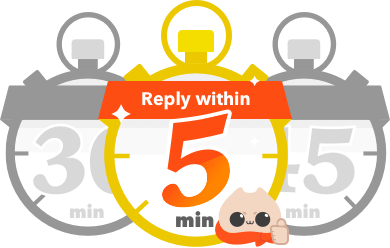Langue maternelle
Langue qui vous intéresse
-
Anglais (USA)
-
Français (Canada)
-
Anglais (GB)
-
Chinois simplifié (Chine)
-
Chinois traditionnel (Taïwan)
-
Japonais
-
Allemand
Pays ou région qu'ils connaissent bien
de la Corée, République De
Pays et régions qui vous intéressent
- du Canada
- du États Unis
- du Royaume-unis
- de la France
- de l'Allemagne
- du Suisse
Présentez-vous
TO THOSE WHO BEGAN TO LEARN THE KOREAN LANGUAGE
When you are learning Korean, please note the difference between 존댓말/높임말 (jondaemal; honorific speech; literally raised speech) and 반말/낮춤말 (banmal; literally lowered speech) from the beginning.
On HiNative, when you want to say "Thank you" in Korean, it is recommended to say 감사합니다 or 고맙습니다 instead of 고마워 or 감사해.
Here are a few tips that may be helpful for you.
1. Misunderstanding of “친구 = a friend”
You might hear from many Korean commenters that 반말 is used to speak casually among "close friends" or 친구. However, it's important to understand that the nuance of "friend" in Korean culture is quite different from what you might think. In Korean, 친구 means "an age-mate" or "a classmate of the same age," rather than the sense of the English word "friend." 반말 is used only among "very close age-mates" or "classmates of the same age" or in romantic relationships. In other words, 반말 is NOT used between "friends" as defined by the English dictionary.
2. Misunderstanding that banmal (반말) is informal, jondaemal (존댓말) is formal.
On HiNative, you might ask a question about informal speech in Korean. However, I have noticed many comments from Koreans that mislead beginner learners by saying "반말 is informal Korean," which is completely incorrect. Actually, there is also an informal form of honorific speech (jondaemal, 존댓말) like an informal honorific form that ends with -요. It is much better for you to use the honorific form (하십시오체, with endings like -습니다/-합니다/-입니다, etc.) when speaking to any Korean adult, regardless of the situation - whether you're at school, on social media, on HiNative, or on the street. Once you become personally close enough to someone, you can then use an informal honorific form (해요체) that ends with -요 (-어요, -해요), such as "감사해요."
3. The use of -니다 (-습니다/-합니다/-입니다) is always safer.
When engaging with others in social settings, whether online or offline, it is more appropriate to employ endings like -습니다/-합니다/-입니다 when communicating with peers or individuals who are older than you. Even if the person you are speaking to is younger than you, it is still appropriate to use -습니다/-합니다/-입니다. As a learner of the Korean language, you will benefit greatly from practicing the use of 존댓말/하십시오체. For example, instead of using "감사해요" (which is casual 존댓말 in 해요체), it is recommended to use "감사합니다" (하십시오체, formal polite).
Essentially, Korean speech is based on these two types of speech forms (존댓말 and 반말), and 하십시오체 (존댓말) is common in adult society.
4. Please ensure this when you ask questions on HiNative.
If you want to learn about the specific language used only among “age-mates,” “classmates of the same age,” or “someone in a romantic relationship,” you can then inquire about “반말 (banmal).” Otherwise, what you may want to know is probably about "formal polite style" (높임말 that ends with -니다) or "informal polite style (해요체 that ends with 요)."
On HiNative, I have noticed that almost all questions in the question section are about "formal form" and "informal form" in Korean. When asking Koreans to answer with “both formal and informal forms”, please make sure to specify whether you are asking "formal polite style" (높임말) and informal polite style (해요체)." While these two categories are within the same jonadeaml (존댓말), nuiances are different, and the answers to your question are also different.
5. Be mindful of the appropriateness of "an informal polite style (해요체)" and slang.
It is true that the use of informal polite terms (ending with -요) makes the speech less honorific and more friendly. For example, instead of replying with "감사합니다" (하십시오체, formal polite), if you say "감사해요" (해요체, informal polite), it may sound friendlier. There are also other slangy and colloquial forms like "ㄱ ㅅ", "감사요", and "감사해여". But here is the thing, they are used only within close circles of relationships. Furthermore, these forms make the expression extremely casual and are nonstandard in social situations in general.
In summary, the use of -니다 (like감사합니다) will be perceived as a sign of social maturity. On HiNative, if you are above high school age, it is recommended to avoid using 반말 that does NOT end with -니다 at all times. It is even advisable not to use 해요체 (-요) on social media platforms. While 감사해요 or 고마워요 is not inappropriate, the choice to say 감사합니다 or 고맙습니다 is often seen as an expression of social maturity. Once again, employing -습니다/-합니다/-입니다 is the best way to speak Korean in all situations if you are an adult. Again, when you want to say "Thank you" in Korean, it is recommended to say 감사합니다 or 고맙습니다 instead of 감사해 or 고마워. Using 감사해 or 고마워 can be offensive to the person you are addressing. I hope this clarifies things for you.
Cheers!




